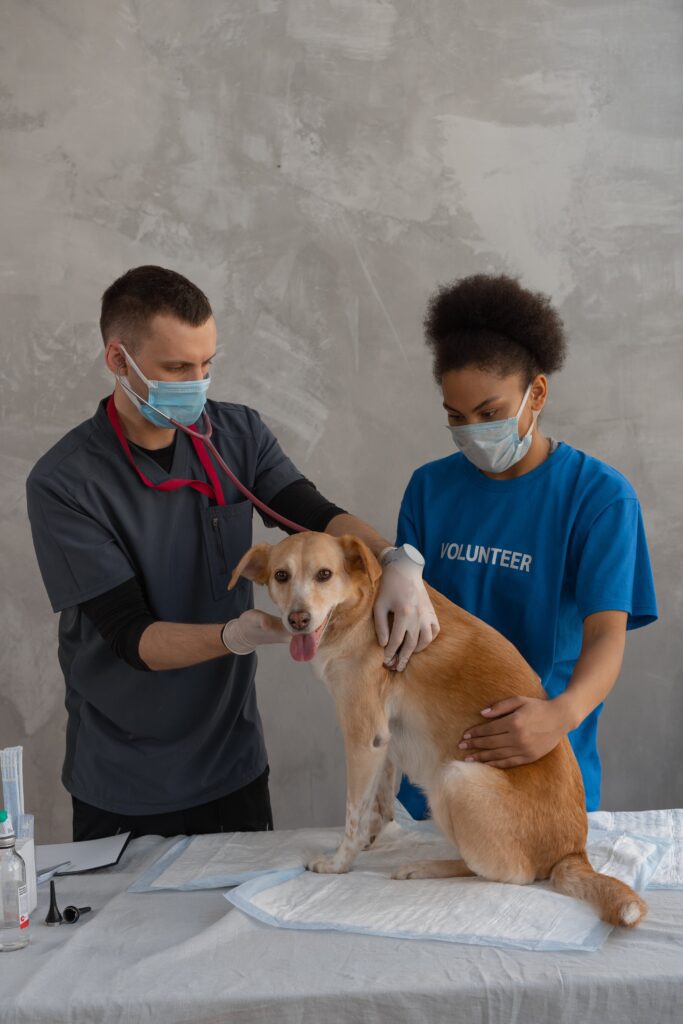Wellness testing is a program of check-ups and blood tests designed to detect early or hidden disease in pets that appear to be healthy.
What is wellness testing?
Wellness testing is a program of check-ups and blood tests designed to detect early or hidden disease in pets that appear to be healthy. Regular wellness testing plays a crucial role in maintaining the health and well-being of our beloved furry friends.
We all want our pets to live long, happy, and healthy lives. However, just like humans, pets can develop various health issues that may not be immediately apparent. Many illnesses and diseases have subtle symptoms or no symptoms at all in the early stages, making them difficult to diagnose. This is where wellness testing becomes essential.
Just like humans undergo regular health check-ups to catch any potential health problems before they become serious, pets can benefit from routine wellness testing. These tests allow veterinarians to evaluate your pet’s overall health, assess organ function, and screen for any underlying medical conditions.
The Importance of Wellness Testing
One of the primary reasons for wellness testing in pets is early disease detection. By catching diseases and health conditions in their early stages, veterinarians can often implement appropriate treatment plans and interventions to alleviate symptoms, slow down disease progression, or cure the condition altogether. This proactive approach can significantly improve the quality of life for our furry companions.
In addition to early detection, wellness testing also helps establish a baseline for your pet’s health. By regularly monitoring blood values and other diagnostic tests, veterinarians can detect any significant changes or abnormalities. This allows for quick identification and intervention if any health issues arise in the future.
Furthermore, wellness testing is especially crucial for senior pets. As pets age, they become more susceptible to certain health conditions, such as organ dysfunction, arthritis, diabetes, and cancer. Regular wellness testing can help identify these age-related issues early on, ensuring prompt treatment and proper management.
What Does Wellness Testing Involve?
Wellness testing typically consists of a comprehensive physical examination and blood work. During the physical examination, your veterinarian will assess your pet’s body condition, listen to their heart and lungs, check for any abnormalities in the abdomen, and examine the skin, eyes, ears, and teeth.
The blood work component of wellness testing involves obtaining a small blood sample from your pet, typically through a quick and relatively painless procedure. This blood sample is then analyzed for various values, including complete blood cell count, blood chemistry (to assess organ function), and certain specific tests based on your pet’s age, breed, and medical history.
Based on the results of the physical examination and blood work, your veterinarian can provide you with a comprehensive picture of your pet’s health. They will discuss any abnormal findings, address concerns, and recommend any necessary treatments or further diagnostic tests.
When Should Wellness Testing be Done?
The frequency of wellness testing may vary depending on your pet’s age and overall health. In general, most veterinarians recommend annual wellness testing for adult pets. However, senior pets and those with ongoing health issues may require more frequent testing, such as every six months or as advised by the veterinarian.
If you have a puppy or a kitten, wellness testing should start early. Young animals are vulnerable to certain diseases, and regular testing can ensure their healthy development and early detection of any congenital conditions.
It’s important to remember that wellness testing is not a substitute for emergency care or immediate veterinary attention. If your pet exhibits any concerning symptoms or experiences an acute health issue, it’s crucial to seek veterinary assistance right away.
Wellness testing is an invaluable tool for keeping our pets healthy and detecting potential health issues early on. By investing in regular check-ups and appropriate blood tests, pet owners can ensure their furry companions enjoy a high quality of life and minimize the risk of serious diseases.
Why do wellness testing?
Dogs are very good at masking illness, and disease may be present even in dogs that appear to be healthy. This is why it’s important to conduct regular wellness testing for your furry friends. Wellness testing involves a series of medical tests and examinations that are done on a routine basis to assess your dog’s overall health. These tests can help identify potential health issues before they become serious and irreversible.
The Importance of Wellness Testing
Many dog owners often wonder why wellness testing is necessary, especially if their dogs seem perfectly healthy. However, there are several reasons why investing in regular wellness testing is crucial:
- Early Detection of Health Problems: Dogs are masters at hiding signs of illness. They can’t communicate their discomfort or abnormalities, so it’s up to us to be proactive in identifying potential health issues. Wellness testing can help detect problems in their early stages, allowing for prompt intervention and treatment.
- Prevention is Better Than Cure: By conducting wellness testing at regular intervals, veterinarians can identify risk factors or early signs of disease. Steps can often be taken to manage or correct the problem before permanent damage occurs. Detecting diseases early means a higher chance of successful treatment and a better prognosis for your furry friend.
- Baseline Health Monitoring: Wellness testing establishes a baseline for your dog’s overall health. With regular tests, your veterinarian can track any changes or deviations from this baseline. This can help identify trends and potential health risks before they become severe.
- Peace of Mind: Regular wellness testing provides assurance to dog owners that they are doing everything possible to keep their pets healthy. It offers peace of mind, knowing that any underlying health issues are being actively monitored and addressed.
- Information for Future Planning: Wellness testing can also provide valuable information for future planning and decision-making. If your dog has any genetic predispositions to certain diseases or health concerns, these can be identified through testing. This knowledge can help guide you in making informed choices regarding breeding or long-term care.
The Wellness Testing Process
The process of wellness testing typically involves a combination of the following:
- Physical Examination: A comprehensive physical examination by a veterinarian is a fundamental part of wellness testing. This examination includes checking your dog’s weight, body condition, temperature, heart rate, respiratory rate, and overall physical appearance. Any abnormalities or potential concerns can be identified during this examination.
- Blood Tests: Blood tests are commonly performed during wellness testing to assess your dog’s blood cell counts, organ function, blood sugar levels, and overall health. These tests can reveal underlying issues that may not be apparent externally.
- Urinalysis: A urinalysis helps evaluate your dog’s kidney function, bladder health, and overall hydration status. It can detect urinary tract infections, kidney disease, and other urinary abnormalities.
- Fecal Examination: Fecal examinations are done to check for the presence of intestinal parasites, such as worms or protozoa. Identifying and treating these parasites is essential for your dog’s overall health.
- Dental Examination: Dental health is crucial for a dog’s overall well-being. During wellness testing, a veterinarian will examine your dog’s teeth, gums, and oral cavity to assess for any dental issues that may require attention.
Regular wellness testing is an investment in your dog’s health and well-being. It allows for early detection of health problems, prevention of irreversible damage, and baseline monitoring of overall health. By prioritizing wellness testing, you can ensure that your furry friend lives a long, healthy, and happy life.
When is wellness testing done?
Wellness testing is an essential part of keeping your dog healthy and preventing potential health issues. It involves a series of tests and screenings that can detect any underlying conditions or diseases before they become more serious. By identifying potential problems early on, you can take the necessary steps to ensure your dog’s well-being.
There are certain guidelines for when wellness testing should be done:
Regular basis
Wellness testing should ideally be done on a regular basis to monitor your dog’s overall health. It is recommended to schedule wellness testing at least once a year. This allows the veterinarian to establish a baseline for your dog’s health and track any changes over time.
During wellness testing, a physical examination will be conducted, and various tests will be performed, such as blood work, urinalysis, and fecal examination. These tests can help identify any abnormalities or signs of illness that may require further investigation or treatment.
Regular wellness testing is particularly important for senior dogs. As dogs age, they become more susceptible to certain health conditions, such as arthritis, diabetes, or kidney disease. By monitoring their health through regular testing, you can detect any age-related issues early on and provide appropriate care.
Combined with annual veterinary visits
Many pet owners choose to combine wellness testing with their dog’s annual visit to the veterinarian. This makes it more convenient and ensures that your dog receives comprehensive care in a single visit.
During the annual visit, the veterinarian will perform a thorough examination, update vaccinations if necessary, and discuss any concerns you may have. By adding wellness testing to the visit, you can get a comprehensive picture of your dog’s health and address any potential problems.
It’s important to note that wellness testing is not a substitute for emergency care or addressing immediate health issues. If your dog is showing signs of distress or has a sudden change in behavior, it’s essential to seek veterinary attention promptly.
Additional testing based on age and health concerns
Your veterinarian may recommend more frequent wellness testing based on your dog’s age or specific health concerns. Puppies, for example, may require more frequent testing to monitor their growth and development.
Similarly, if your dog has a known health condition or is at a higher risk for certain diseases, your veterinarian may recommend more frequent or specialized testing. This could include genetic testing, specific blood panels, or imaging studies.
Regular wellness testing can help detect and monitor many common health issues in dogs, such as heartworm disease, tick-borne illnesses, kidney and liver function, and thyroid disorders. By staying proactive, you can ensure that your dog stays happy and healthy for years to come.
A Long, Healthy, and Active Life
Wellness testing is an investment in your dog’s health and well-being. By staying proactive and vigilant, we can give our pets the best chance at a long, healthy, and active life. Regular testing not only helps in detecting potential problems but also helps in maintaining optimal health and preventing future issues.
“Prevention is better than cure.”
TL;DR
Wellness testing is a simple and effective way to monitor your dog’s health. It involves routine tests such as bloodwork, urine analysis, and physical examination to identify potential health issues early on. Early detection allows for prompt treatment, reducing the risk of complications and ensuring a longer, healthier, and more active life for your furry friend.



